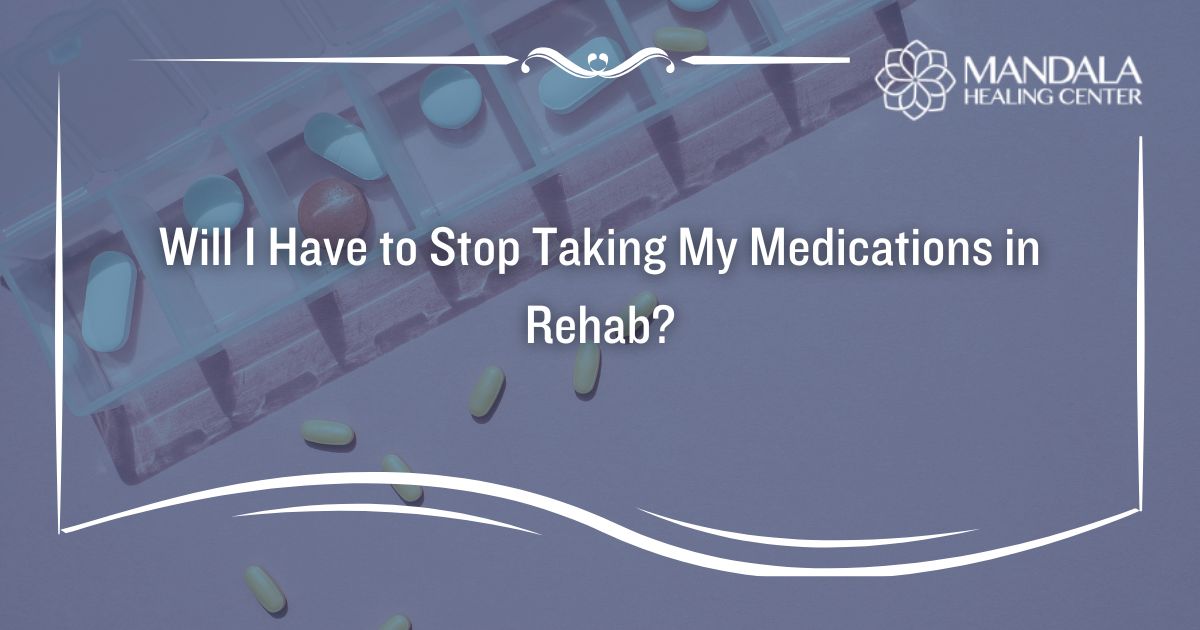Entering an addiction treatment center can be a scary and confusing time. You probably don’t know how everything works, from unknowns about therapy sessions to rules about what you’re allowed to bring. If you take prescription medication, you might be worried that your rehab will not allow you to take them.
Thankfully, most medications are permitted during addiction treatment. According to the Substance Abuse and Mental Health Services Administration (SAMHSA), “approximately 21.5 million adults in the United States have a co-occurring disorder.”[1] As many mental health conditions are managed with prescription medication, your rehab center will not prevent you from taking one that is benefitting you.
That said, some prescription drugs are habit-forming and addictive. If you take opioids, stimulants, benzodiazepines, or sedatives, your treatment center might ask you to wean off of them. Taking these types of medications hinders your ability to achieve long-term recovery from drug and alcohol abuse.
In this article, you will learn:
- How your prescriptions are handled during addiction treatment
- What types of medications are not permitted during rehab
- Will your rehab replace the banned medicines that you aren’t allowed to take
Taking Your Prescriptions in Rehab: What to Expect
If you take any prescription medications, you should bring them with you to rehab. Most medications are permitted during inpatient rehab. For example, if you take an antidepressant, a mood stabilizer, an antipsychotic, diabetes medication, asthma medication, or blood pressure medication, you have nothing to worry about.
Typically, you will give your medication to one of the medical professionals at the facility. You will be given your dose when it’s time to take your pills. During rehab, you will not have control over your medications to prevent you from misusing them.
Addiction treatment programs are not meant to be a punishment. If you take medications for physical and mental health conditions, your new doctors will allow you to continue taking them. The only exceptions to this are if you are taking an addictive medication or your doctor knows of a better course of treatment for you.
Are There Medications You Can’t Take in Addiction Treatment?
Some medications are habit-forming and addictive. If you are on a medication that poses a risk of developing a substance use disorder, your rehab might ask you to wean off of it. Getting off of addictive medications might be a part of your treatment plan.
Examples of medications you might not be allowed to take include:
- Opioid medications for chronic pain like oxycodone, hydrocodone, morphine, and more
- Benzodiazepines for anxiety like Xanax, Klonopin, Ativan, and more
- Sedatives for insomnia like Lunesta or Ambien
- Stimulants for attention-deficit hyperactivity disorder (ADHD) like Adderall, Ritalin, Concerta, Focalin, and more
While these medications can help the medical conditions they are meant to treat, they pose a risk of addiction. When you are recovering from drug and alcohol addiction, it is best to avoid any type of substance that could trigger you. If you are addicted to a medication you are prescribed, you should seek help from a prescription drug rehab center.
Will Your Rehab Find You Replacements for Addictive Medications?
Thankfully, the doctors working at your rehab center will find replacements for any medication you are not allowed to take. For example, SSRIs can be a better option for individuals using benzodiazepines to treat anxiety. If you are taking sedatives for insomnia, some antidepressants have a sedating effect that would help you sleep without risking long-term addiction.
If you have been taking an addictive prescription medication for some time, your rehab doctor will help you wean off of it. You might require medication-assisted treatment if you are coming off prescription opioids. Suboxone can be a great tool for tapering off of opioid drugs.
To sum things up, you will receive a replacement medication for any drug your rehab tells you you cannot take. Additionally, your doctor will help you taper off your medication to prevent withdrawal symptoms or cravings from arising.
Get Connected to a Top-Rated Drug and Alcohol Rehab Center
Prescription medications can treat physical and mental health disorders that interrupt your daily life. When you attend rehab, you want to make sure you can continue taking medicines that are helping you. At the Mandala Healing Center, we allow you to take any medication that is not addictive or habit-forming.
Our rehabilitation center provides individualized and evidence-based care. In addition to helping you take your daily medications, we offer individual therapy, group counseling, relapse prevention planning, and more.
Why Choose The Mandala Healing Center? Clients are taken on a journey of healing through complete immersion into evidence-based clinical modalities, multifaceted alternative therapies, and expert medical management, allowing them to fully detox and recover from drug and alcohol addictions. Through a program of care designed to encourage change, a foundation is created that allows clients to find their higher purpose and reclaim their lives.
Contact us today for more information on how our prescription drug addiction treatment center works.
References:
- The Substance Abuse and Mental Health Services Administration (SAMHSA): Co-Occurring Disorders and Other Health Conditions
















